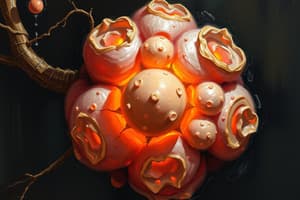Podcast
Questions and Answers
Which process involves NK cells binding to antibody-coated cells for destruction?
Which process involves NK cells binding to antibody-coated cells for destruction?
- Complement System Activation
- Eosinophil/Mast Cell– Mediated Reactions
- Antibody-Dependent Cellular Cytotoxicity (ADCC) (correct)
- Immunoglobulin E–Mediated Reactions
What is the activating receptor on NK cells that triggers the destruction of antibody-coated cells?
What is the activating receptor on NK cells that triggers the destruction of antibody-coated cells?
- FcεRI
- CD56
- FcγRIII (CD16) (correct)
- FcγRII (CD32)
In addition to cancer treatment, ADCC is involved in the destruction of cells infected with which type of viruses?
In addition to cancer treatment, ADCC is involved in the destruction of cells infected with which type of viruses?
- Retroviruses
- RNA viruses
- Enveloped viruses (correct)
- DNA viruses
Which system consists of proteins that aid in host defense against microbes and tissue injury?
Which system consists of proteins that aid in host defense against microbes and tissue injury?
How can the complement system be activated in the absence of antibodies?
How can the complement system be activated in the absence of antibodies?
What does the complement system's activation involve?
What does the complement system's activation involve?
Deficiencies in complement proteins can result in increased susceptibility to which of the following?
Deficiencies in complement proteins can result in increased susceptibility to which of the following?
What is the function of complement proteins bound to antigen-antibody complexes?
What is the function of complement proteins bound to antigen-antibody complexes?
In addition to their role in peripheral lymphoid organs and the bloodstream, where else do antibodies have protective functions?
In addition to their role in peripheral lymphoid organs and the bloodstream, where else do antibodies have protective functions?
Which type of reactions are related to ADCC, in addition to Immunoglobulin E–Mediated Reactions?
Which type of reactions are related to ADCC, in addition to Immunoglobulin E–Mediated Reactions?
Flashcards are hidden until you start studying
Study Notes
Antibody-Dependent Cellular Cytotoxicity (ADCC) and Natural Killer (NK) Cells
- NK cells bind to antibody-coated cells and destroy them through a process called ADCC.
- FcγRIII (CD16) is an activating receptor on NK cells that binds to IgG antibodies and triggers the destruction of antibody-coated cells.
- ADCC is involved in the destruction of cells infected with enveloped viruses and is a mechanism of action for therapeutic antibodies used in cancer treatment.
- Immunoglobulin E– and Eosinophil/Mast Cell– Mediated Reactions are also related to ADCC.
The Complement System
- The complement system consists of proteins that aid in host defense against microbes and tissue injury.
- It can be activated by microbes in the absence of antibodies as part of the innate immune response, or by antibodies as part of adaptive immunity.
- The complement system's activation involves proteolytic cleavage of proteins, leading to the generation of effector molecules that help eliminate microbes.
- Deficiencies in complement proteins can result in immune deficiencies, increased susceptibility to infections, and autoimmune diseases.
Complement System Functions
- The complement system not only has antimicrobial functions but also stimulates B cell responses and antibody production.
- Complement proteins bound to antigen-antibody complexes are recognized by follicular dendritic cells in germinal centers, promoting antibody production.
- Antibodies have protective functions at mucosal organs and the fetus, in addition to their role in peripheral lymphoid organs and the bloodstream.
Studying That Suits You
Use AI to generate personalized quizzes and flashcards to suit your learning preferences.



